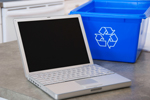INSTALL A GOOD ANTI-VIRUS PROGRAM
Because XP will no longer get security updates, a good anti-virus program will be your computer and network's first line of defense against online evil-doers. To make matters worse, Microsoft stopped updating the Security Essentials software for XP, so their free anti-virus program will do you no good. Although there are some good, free anti-virus programs available, remember that your ISP (Xfinity or Uverse) provides a full-fledged security solution that is available for download from their website. Xfinity offers Norton and Uverse offers McAfee. If you would rather pay?! Then I recommend XP users invest in one of the top-of-the-line programs like Kaspersky, Trend Micro, or Webroot. These programs are updated regularly and will help you maintain the dependability of your network.
UPDATE YOUR SOFTWARE PACKAGES AND KEEP THEM UPDATED
You can prevent some invasions of your computer by making sure your keep the programs and other software you use up-to-date. This is particularly true of widely-used, web-based software like Adobe Acrobat, Flash, and Java. Since you will be using an unsecured operating system, vulnerabilities in these programs will be available for outside parties to exploit. If you continue to use XP, it will be essential that you keep all your software updated.
CHANGE YOUR WEB BROWSER
Internet Explorer 8, the most recent version of the browser available for XP machines, is fairly old and will no longer be updated with security patches. You need to change to another browser. Google says it will continue to support their Chrome browser (my browser of choice) on XP until April of 2015. Mozilla has no announced plans to stop supporting its Firefox browser on XP, so both Chrome and Firefox would be good choices for XP users.
UPDATE YOUR COPY OF MICROSOFT OFFICE XP OR 2003
Along with ending support for Windows XP, Microsoft is also going to stop supporting its Office 2003 software suite on April 8, 2014. So if you are running Office 2003 or it's older cousin Office XP, now would be the time to upgrade. Using these unsupported versions of Office without an updated operating system leaves you vulnerable to an attack. Be aware that the latest versions of Office will not work on an XP machine. The last version of Office that was compatible with an XP machine was Office 2010.
STOP USING OUTLOOK EXPRESS
If you are using Outlook Express to access your email you have to stop. Express has traditionally been a route many cybercriminals have used to spread malware. Using it without a secure, updated operating system only makes the program more insecure. We strongly suggest you upgrade your email account to a full version of Outlook available as part of the Office software suite.
UPDATE YOUR DEVICE DRIVERS AND KEEP THEM UPDATED
Some device drivers can contain security flaws. There are a number of tools that claim to be able to check your drivers and identify those that need to be updated, but most are weighed down with adware and toolbars, so we recommend that clients just go to their device manager and check the drivers there. You should be able to check the dates in device manager against the dates on the drivers on the manufacturers' website. Be aware that manufacturers will likely start stepping away from updating drivers made for the XP version of Windows now that Microsoft is no longer supporting it.
DISABLE JAVA FOR WEB BROWSING
Java software has earned a reputation for exposing users to some serious security issues. Some software requires Java to work so some of us need it on our machines. But few, if any, of that functionality is web-based and works through your browser. The best way to prevent Java vulnerabilities from putting your computer at risk is to turn it off in your browser. To do this:
- Go to the Control Panel and select "Java."
- In the "Java Control Panel," select the "Security" tab.
- Uncheck the "Enable Java content in browser" box and select "OK."
Again, if you are going to keep using XP after Microsoft stops supporting it, you should do each of the things we call out above. The unsupported XP will quickly spring security leaks and beefing up security measures around it is the only way to continue using it without putting your data at risk.

